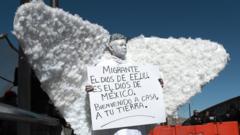In Ciudad Juarez, a Mexican border city, workers are diligently erecting a tent city to accommodate potentially thousands of individuals who may be deported from the United States. This initiative comes in response to the anticipated mass deportations that President Donald Trump has characterized as "the largest deportation in American history."
Constructed in the vicinity of the old fairgrounds, the tent city will provide temporary shelter for Spanish-speaking laborers, domestic servants, farm workers, and other members of the estimated five million undocumented Mexicans currently living in the US. The Mexican government is proactively preparing to assist these returnees, with a program called "Mexico Embraces You" that assures food, medical care, and help in obtaining necessary identity documents. Interior Minister Rosa Icela Rodriguez has affirmed that Mexico will prioritize care for these citizens, stating, "Mexico will do everything necessary to care for its compatriots."
President Claudia Sheinbaum has also pledged to address the humanitarian needs of those being deported, assuring them access to social programs, pensions, and work eligibility upon their return. Despite the looming concerns over the implications of Trump’s immigration policies for Mexico, Sheinbaum has encouraged calm and emphasized open dialogue between the two countries.
However, the potential strain on local resources and facilities is a significant concern. Jose Maria Garcia Lara, director of the Juventud 2000 shelter in Tijuana, worries about the capacity to accommodate new arrivals, describing the existing shelter as nearly at full capacity. He noted that the combination of deportations and migrants fleeing violence poses a unique challenge that could overwhelm local services.
Additionally, Trump’s "Remain in Mexico" policy—requiring migrants to stay in Mexico while awaiting asylum proceedings—complicates matters, as past implementations have seen Mexican border towns struggle to support individuals subjected to hazardous conditions. Sheinbaum has made it clear that Mexico does not intend to accept non-Mexican asylum seekers while they wait for hearings, showcasing a potential friction point in US-Mexico relations.
As the situation continues to evolve with heightened security measures, including the deployment of US troops to the southern border, Ciudad Juarez and surrounding areas brace for the imminent arrival of those caught up in the political shifts on migration. The Mexican government faces an uphill battle in providing adequate support and shelter to migrants returning home, and local communities are urged to prepare for what could be a transformative and challenging period as deportations commence.




















